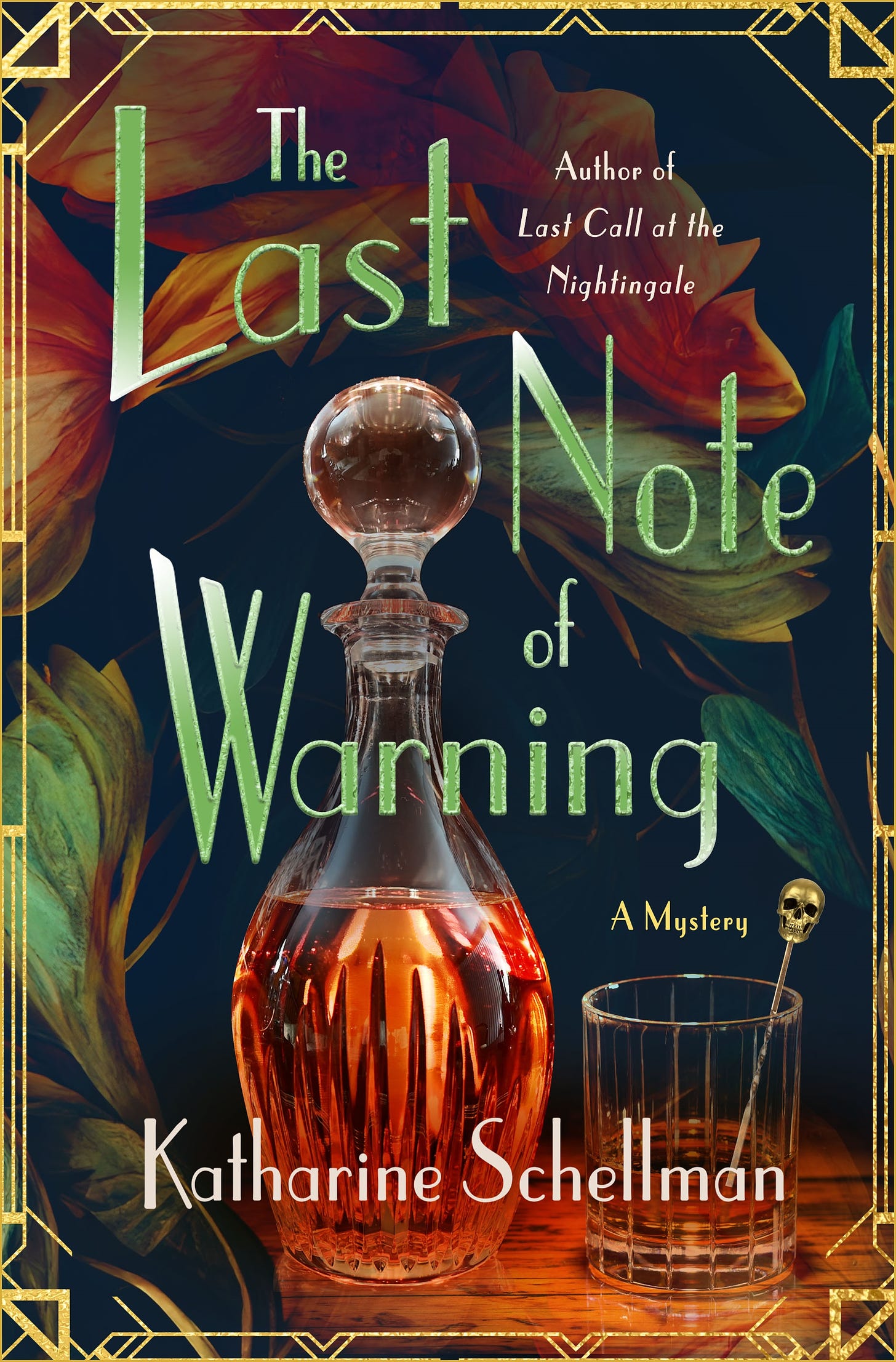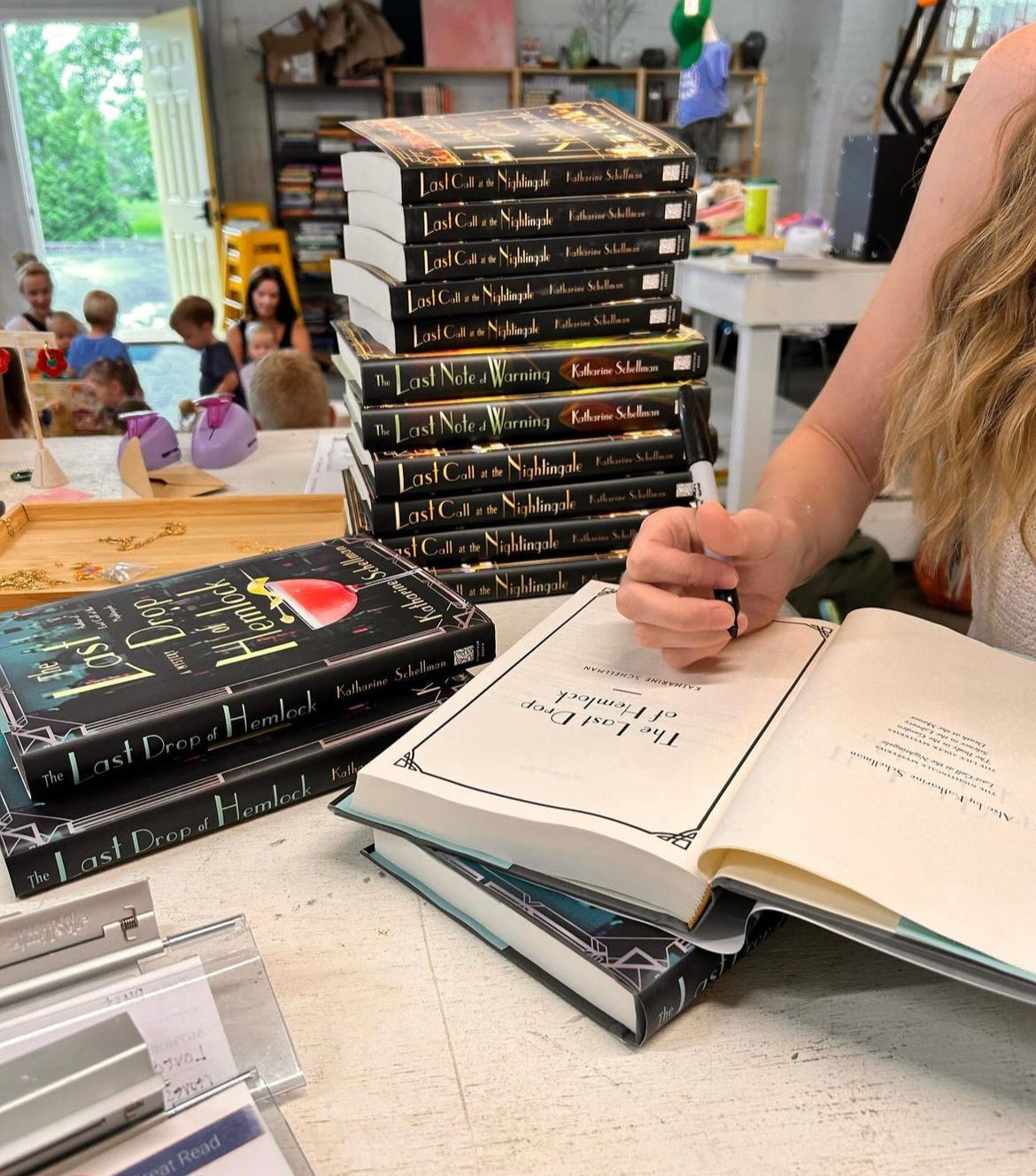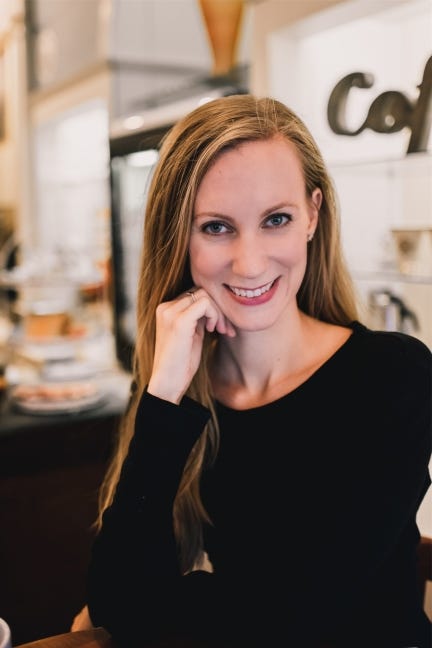"you need less time to write a book than you think"
novelist Katharine Schellman on planning and setting the bar low as a way to get a ton of writing done
Hello there! Welcome to Write More, Be Less Careful, a newsletter about making space for creative practice in a busy life. I’m a poet and an essayist, and my most recent books are the poetry collection Pocket Universe and the anthology The Long Devotion: Poets Writing Motherhood, which I edited with the poet Emily Pérez. My next book, The Good Mother Myth, will be out in January 2025, and you can pre-order it now!
Today’s post is in the tending section, which is a mix of essays and interviews about creative practice that do a deeper dive into a particular craft element or process question. If you’re juggling writing, a day job, and parenting or other caregiving responsibilities, I think you’ll really love today’s practical piece by novelist Katharine Schellman, who share tips for planning and outlining and using achievable word count goals as a way to get your writing done when you’re busy.
Today’s post is a guest essay by Katharine Schellman, a novelist whose most recent book, The Last Note of Warning, takes us into a speakeasy in Prohibition-era New York, where Vivian Kelly has to solve a murder after being framed. It’s a fun, twisty mystery with great character development and period details. (And it’s the third in her “luscious, mysterious, and queer Nightingale mystery series.”)
Katharine’s an incredibly prolific writer, and she’s also a parent of two young kids. As she shares below, she had to confront the same cultural narrative a lot of us struggle with: that mothering is the enemy of art. For Katharine, the answer to sustaining her writing along with parenting and working a day job is all about efficiency and planning.
Below, Katharine—who’s published 7 books since April 2020, with 8 and 9 on the way!—shares her method for doing so much writing, even without a bajillion uninterrupted hours to work or the unlimited childcare so many of us might wish for. If you’re feeling overwhelmed by trying to fit your writing in along with the rest of your life, I think you’ll really like her low-stress, helpful tips.
Katharine, on why you need less time than you think to write a book
By the time I was in my mid-twenties, I knew the two big things I wanted to do next were write books and have kids. But every cultural narrative around me said that having kids would leave me almost no time to be creative, while every artistic narrative around me said that books required lots of time to get written. Real writers needed to write every day, in quiet, without worrying about caretaking responsibilities. They needed to think deep writerly thoughts without interruption and devote years of their lives to producing each work.
The books, I decided, would need to happen first. I had to get published before I had kids, or it was never going to happen.
But—and this won’t be a surprise to anyone who has been very attached to the idea of a perfect timeline—things didn’t happen in that order. My first child was born in 2016, when I was several drafts into a manuscript that was almost but not quite right. As the sole breadwinner for my small family, I took a year off from writing and wondered if I would ever get back to it.
Eventually, slowly, I did. That book became the one I queried, the one that got me an agent and my first book deal. I wrote another book, then another. I had another baby. I wrote another book.
My first book came out in April 2020. Four years and two months later, my seventh just hit bookshelves. My eighth book will be out in August, my ninth next summer. Along the way, I discovered that what I thought I knew about writing wasn’t true. I don’t need silence and solitude to write (though it’s nice when I can get it). I don’t need to avoid caretaking responsibilities or to spend years completing a single project. I don’t even need to write every day.
What I needed was to think about my writing differently: not in terms of what I couldn’t get done, but in terms of what I could. With kids and a day job, time to write is often limited. I had to be efficient with the time that I had.
Luckily, I also learned that you need less time to write a book than you think.

It takes about 300 word to fill a single typed page. If you write 300 words a day, it will take about a year to write a book. If you write 600 words a day, that’s around half a year. At 900 words a day, you can finish a book in three to four months.
Here's where things get tricky: they need to be mostly words you will keep, which means getting organized about what you’ll write before you write it. You need a plan.
I like to outline my books in scene-by-scene paragraphs, and I think of that outline as a first draft. I’ll take two or three weeks to write it, using the time to develop both the bigger story arc and the individual character arcs. If I think of dialogue or descriptions when I’m outlining, I’ll put those in too. By the time I’m ready to draft, I can sit down to write each time knowing where to start and where I need to arrive. If I’m excited about a particular scene or having trouble getting through a transition, I can hop around and still know how everything will fit together when I’m done, making it easy to go back and fill in the gaps.
Creative work is work. And like any kind of work, we only have so many hours in a week to get it done. Having a plan can help you use those hours well.

I can already hear the protests: planning will stifle your ability to be creative. You won’t be able to discover new things as you go. And to that I say: a plan is not a prison. In the same way you can (and will) change things from a first draft to a second, you can (and will!) change things from a plan to a first draft. A plan is simply a roadmap that lets you work more efficiently when your work hours are limited. Because creative work is work. And like any kind of work, we only have so many hours in a week to get it done. Having a plan can help you use those hours well.
❤️️ if you find Katharine’s low-stress approach to writing a ton helpful, click the red heart at the top or bottom to help other busy writers find us! ❤️️
If you’d like to try it out…
Outlining works for me, but if that’s not how your brain works, there are many ways to plan. You can:
Go for a walk and dictate your ideas for each scene into an app that will transcribe what you say.
Finish each writing session by listing bullet points for what will happen in the next scene.
Make a visual roadmap of your book, including key scenes, emotional beats, or other turning points that will be your “destinations” along the way.
Write short descriptions of each plot point or scene on index cards that you can move around to play with the order.
Experiment to find the system that works best for you. The first key is to always have a plan for the scene you’ll write, and what that scene needs to accomplish, when you sit down to work.
The second key is to not set your expectations too high. That sounds counterintuitive; you’re trying to write a book as quickly as possible! You need to write a lot of words right now. Right?
Wrong. If you tell yourself you’re going to write 2,000 or more words every day until your book is written, you’ll scare yourself off before you even get started. Instead, focus on the 300 words it takes to fill one page. You’re going to write 300 words a day until your book is done.
Maybe some days you’ll write 50 words instead. That’s still 50 words more than you had yesterday. Great job! Some days you might be on a roll and write 1,500 words instead. Good for you! You’re making even faster progress. But as long as you’re averaging 300 words a day, you’re on track.
Feeling stuck? Try listing bullet points for what needs to happen. You might get through five bullet points and discover you’ve started writing paragraphs again. Excellent! You might end up with a scene that’s entirely bullet points. That’s okay too. Those bullet points are part of your word count. You’ll turn them into a scene in your second draft.
Because here’s the real secret: your 300 words don’t have to be the best words you’ve ever written. They never will be, not at this stage, so don’t put that kind of pressure on yourself. That’s what editing is for. Right now, you’re writing 300 words a day, and all those words need to do is keep you moving forward.
If you keep writing and keep following your plan, before you know it, you’ll have a book. And it will take less time than you think you need to make it happen.
Katharine Schellman is a former actor, one-time political consultant, and current writer of historical mysteries. Her novels, which reviewers have called “worthy of Rex Stout or Agatha Christie,” have received starred reviews from Publishers Weekly, Library Journal, and BookPage, along with being named one of Suspense Magazine’s Best Books of the Year, a Library Journal Best Crime Fiction of the Year, and a New York Times editor’s pick. A graduate of William & Mary, Katharine lives and writes in the mountains of Virginia with her husband, children, and the many houseplants she keeps accidentally murdering. You can find her on Instagram, Facebook, Goodreads, and BookBub.
previously, on writing and planning
how to keep going when you truly have no time to write
how to get unstuck by being kinder to yourself
how poet Remica Bingham-Risher channels Lucille Clifton to get her writing done
Write More, Be Less Careful is a newsletter about why writing is hard & how to do it anyway. I’m so glad you’re here.
If Write More has helped you in your creative life, I’d love it if you would share it with a friend.













I resonate with this wholeheartedly. I'm a mum with two toddlers. I have just finished the first draft of my first book and currently editing. I do not get the quiet and solitude others tout to get it done but I make it work ☺️
A plan is not a prison ❤️